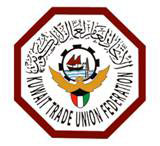Related Research Articles

The International Confederation of Free Trade Unions (ICFTU) was an international trade union. It came into being on 7 December 1949 following a split within the World Federation of Trade Unions (WFTU), and was dissolved on 31 October 2006 when it merged with the World Confederation of Labour (WCL) to form the International Trade Union Confederation (ITUC).

The World Confederation of Labour (WCL) was an international labour organization founded in 1920 and based in Europe. Fascist governments of the 1930s repressed the federation and imprisoned many of its leaders, limiting operations until the end of World War II. In 2006 it became part of the International Trade Union Confederation (ITUC), ending its existence as an independent organization.
The Union of the Independent Trade Unions of Albania (BSPSH), is a National Confederation of Trade unions in Albania. It was established in 1991 and held its first national conference in February, 1992. It has an estimated membership of 85,000.
The Confederation of Trade Unions (KSSh) is a national trade union federation in Albania. It is a successor organization to the Trade Unions of Albania.
The General Centre of Independent and Free Unions of Angola (CGSILA) is a national trade union centre of Angola. With a membership of 50,000, it is led by Manuel Maria Difuila as President.
The Antigua Workers' Union (AWU) or (ABWU) is a national trade union centre of Antigua and Barbuda. It was formed in 1967 after a split from the ATLU. The AWU created the Progressive Labour Movement (UPP) in 1970.
The Antigua and Barbuda Public Service Association (ABPSA) is a national Trade union of Antigua and Barbuda. First recognized in the 1980s, the ABPSA is a small organization with competition from other unions in the public service sector.

The Latin American Confederation of Workers, was the World Confederation of Labour's (WCL) regional organization for Latin America and the Caribbean. The WCL merged with the International Confederation of Free Trade Unions in 2006, and in 2008, CLAT merged with the ICFTU Inter American Regional Organisation of Workers to form the Trade Union Confederation of the Americas.
The General Federation of Workers Trade Unions in Bahrain(Formerly known as the General Committee for Bahrain Workers) (GFWTUB) is a national trade union federation in Bahrain. It was established in 2002, by the Workers Trade Union Law granting workers the right to organize collectively.
The National Union of the Unions of the Workers of Benin (UNSTB) was, from its founding in 1974 until the 1990s, the sole union federation in Benin. It was originally closely related to the People's Revolutionary Party of Benin (PRPB).

The Workers' United Center of Chile is a union federation in Chile. The CUT was founded in 1953, but it was suppressed after the Chilean coup of 1973. It was refounded in September 1988 near the end of Augusto Pinochet's dictatorship.
The Union of Djibouti Workers (UDT) is a trade union centre in Djibouti. It was founded in 1992, and is affiliated with the International Trade Union Confederation (ITUC).
The East Timor Trade Union Confederation (TLTUC/KSTL) is the main trade union in East Timor. It was formed in 2001 with the support of the ITUC, the ILO, and Australian trade unions.

The Kuwait Trade Union Federation is the sole national trade union center in Kuwait. It was founded in 1968 and is affiliated with the International Trade Union Confederation.
There are few trade unions in Oman, established following a 2006 Decree by the Sultan of Oman permitting their organization. Some of these, have done completed elections, they are members of the General Federation of Oman Trade Union (GFOTU). Oman has become the third Gulf Arab state, after Bahrain and Kuwait, to have a general federation of trade unions.
The Saint Kitts and Nevis Trades and Labour Union (TLU) is a general union in St Kitts and Nevis.
The General Alliance of Labour Unions in Suriname is a trade union federation in Suriname. It was founded in 1951.
Trade unions in Afghanistan have a brief and turbulent history, beginning in 1967 and effectively ending with the Islamic state of the Mujahideen. There has been no reported trade union activity since the military intervention and removal of the Taliban regime.

The International Trade Union Confederation (ITUC) is the world's largest trade union federation.
Trade unions in Botswana operate within a longstanding democratic system in which the government of Botswana has ratified the International Labour Organization's core conventions, including Conventions 87 and 98.
References
- ↑ ICTUR; et al., eds. (2005). Trade Unions of the World (6th ed.). London, UK: John Harper Publishing. ISBN 0-9543811-5-7.
- ↑ "TRADE UNION RIGHTS IN LAW". Benin: Annual Survey of Violations of Trade Union Rights (2006) ITUC. Retrieved 2007-07-30.
- ↑ "INTERNATIONALLY-RECOGNIZED CORE LABOUR STANDARDS IN BENIN". ICFTU REPORT FOR THE WTO GENERAL COUNCIL REVIEW OF THE TRADE POLICIES OF BENIN. Retrieved 2007-07-30.
- ↑ ICTUR; et al., eds. (2005). Trade Unions of the World (6th ed.). London, UK: John Harper Publishing. ISBN 0-9543811-5-7.
- ↑ "Serious violations of core labour standards in Benin, Burkina Faso and Mali". ICFTU Online. Retrieved 2007-07-30.